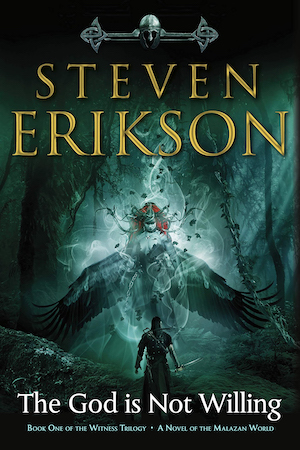Welcome back as we take our first plunge into the actual text of Steven Erikson’s The God Is Not Willing—we’ll be covering the prologue and first two chapters of the novel, and if you want to read along, you can find the prologue here. And in case you missed it, I put together a refresher on everything readers will need to know heading into the book, which takes place roughly a decade after the events of The Crippled God. And now, without further ado, let’s join the four Teblor standing on a sloping, ragged ridge high in the mountains…
First of all, take a look at the language used in these opening paragraphs: “flanking,” “bleeding,” “tearing at loose weapons,” “shoved,” “incensed,” “broken,” “defensive wall”, “saw-toothed”, “Buckled,” “shattering,” “fortresses”, “warred.” Markers are clearly being laid down. If I told you this book was going to give us a lot of conflict and a broken world order, how surprised would you be? I’m guessing a number of reviews of TGINW will label it a more “accessible” Erikson book. I know I do in my own review, coming up in a few weeks. But here’s our immediate reminder that “accessible” doesn’t have to mean “simple.” Erikson has always been an author that rewards attentive, close reading. An author who layers his meaning and intent, who lays down early markers for what’s to come. That remains the case here.
***
If you remember back to when we first met Karsa, Dayliss was the young Teblor woman he thought he was in competition for with his friend Bairoth. Though it turned out it hadn’t actually been a competition for some while, as Bairoth and Dayliss had long been sleeping together even as they “laughed at [his] clumsy efforts to court her” (that’s gotta hurt!). Here, of course, she is “Widowed” Dayliss because Bairoth never returned from his raid with Karsa on Silver Lake.
***
“Everything was changing” seems like one of those exaggerated overreactions to events. I’m here to say it is not.
***
See if this sounds at all familiar:
There had been few Uryd, having heard Elade’s tale, who came to comprehend the significance of this news. Life’s pace was slow, the measured beat of seasons. If it had been colder this past winter, why, it had been warmer the winter before that … if the forests themselves now climbed higher upon every mountain side, while trees much further down died to summer droughts and pestilence … so too would the ways of the Teblor shift and adapt and accommodate.
Here is our first, but far from our last, echo of the way humanity has chosen to deal (or more accurately, not deal) with climate change—no big deal, nothing different, it’s just nature, if it happens we’ll just adapt to the new normal, those worrying about it are just ridiculously anxious, nothing to see here…
***
When Elade asks if they have not heard or do not believe the rumors of Elade’s rise to warleader of the Rathyd and Sunyd, and of “a thousand slaver-children now mark [ing] our victorious trail back to our homelands, each one riding a Sunyd or Rathyd spear,” he’s referring to an attack on the southlanders who enslaved the clans lowest down the mountain, an ending to the slave trade and a liberation of those Teblor in chains. The references should jog readers’ memories that Karsa himself was (for a very brief time) a slave. If you remember what happened to the slave master Silgar, you know Karsa got his vengeance. The Malazan Empire did outlaw slavery once they were in control of the continent.
Meanwhile, Elade’s story of his father being killed is a reminder of the bloody havoc Karsa and his two friends wreaked as they headed through Teblor territory to raid Silver Lake. “Bloody havoc,” of course, pretty much being Karsa’s middle name.
***
This kind of cataclysmic flooding, a barrier holding back an entire sea suddenly breaking and releasing the water, seems a disaster on an unimaginable scale and clearly in the realm of fantasy, but it’s actually happened multiple times in history. At the end of the Ice Age, a 2000-foot ice dam broke and poured floodwaters from Glacial Lake Missoula across several northwestern states. The same occurred in central Canada when an ice dam broke and released the waters of Lake Agassiz (bigger than the combined Great Lakes), which some theorize led to the 1000-year cooling of the globe known as the Younger Dryas. Events that Erikson, an archaeologist, is of course well aware of.
***
“If the Shattered God is to play a role in it, then it will be at the end of my bloodsword.”
Let’s just say this regarding those who boast about killing Karsa—it hasn’t served them well. Not well at all.
***
Buy the Book


The God Is Not Willing
When Dayliss says it could have been Bairoth instead of Karsa that killed Elade’s father, Elade tells her he witnessed it. If you recall (or if you go dig up the scene as I had to do), there was an attack where Karsa purposely let a youth go as part of his plan. Interestingly, at the time, Delum told Karsa: “This youth, Karsa Orlong, will become an adult. And he will not be content to follow, he will lead. He must lead; and none shall challenge his fierceness, the gleaming wood of his will, the oil of his desire … You have made … an enemy to pale all we have known in the past.” To which Karsa replies, “that Rathyd warleader shall kneel before me.”
As willful, even perhaps boastful a presence as Elade is, he’s not insane, as we see when he even he says knocking off the entire Malazan Empire is way beyond his abilities. Nor is it his goal. Baby steps. (Karsa, of course, has vowed to bring down not just the Empire but “civilization.”)
***
So who are the allies Elade makes reference to? He tells Dayliss the Teblor will “not be alone” in their attacks on the southlanders and has also told them all that he has traveled much lately. Where has he gone? To whom has he spoken?
***
Dayliss is no dummy (something to think about when she says Karsa’s seeming indolence is simply drawing breath before action) and gives good advice when she tell Elade not to use the impending flood as a motivator. Slavery, bounty-hunting, claiming of Teblor lands—these are all concrete, recent events. Easy to recall, easy to see the impact, easy therefore to use as incitement material. But ask people to take action based on a speculative if predictable event? Good luck with that. Not, of course, that this has any connection to our real world. We all know fantasy is escapist make-believe…
***
And then we close as we open, with descriptive language. Something shiny on the surface, while unseen danger rises behind. Layers. Always look at the layers.
***
Next week, we’ll pick up with Chapter One (which you can find here) in the lead up to the novel’s release on November 9th. See you for more Malazan next Monday!
(Please note: Because The God Is Not Willing has already been published in the U.K., some potential spoilers may appear in the comments below, so please proceed at your own risk.)
Bill Capossere writes short stories, essays and plays; regularly reviews for Fantasy Literature; and pens the occasional post (or seven-year reread) for Tor.com. He lives in Rochester, NY, where in addition to writing and reading, he bikes to work as an adjunct English instructor, plays ultimate Frisbee and disc golf, and looks forward to the six-week hiking/camping trip he takes every summer. He can also be found on Twitter.










